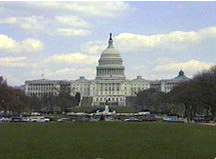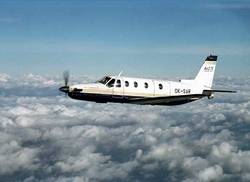NATA: Thanks For Your Support. Please Pass Our Bill
 National Air Transportation Association (NATA) president James
K. Coyne last week thanked key Congressional aviation leaders for
their continued support of financial assistance to general aviation
businesses affected by the September 11th terrorist
attacks.
National Air Transportation Association (NATA) president James
K. Coyne last week thanked key Congressional aviation leaders for
their continued support of financial assistance to general aviation
businesses affected by the September 11th terrorist
attacks.
The House Committee on Transportation & Infrastructure on
Wednesday approved H.R. 2115, the "Flight 100-Century of Aviation
Reauthorization Act" (CARA), sponsored by US Reps. Don Young
(R-AK), Chairman of the House Committee on Transportation and
Infrastructure; James Oberstar (D-MN), Ranking Minority Member of
the House Committee on Transportation & Infrastructure; John
Mica (R-FL), Chairman of the House Subcommittee on Aviation, and
Peter DeFazio (D-OR), Ranking Minority Member of the House
Subcommittee on Aviation.
On To The Floor Of The House
 "I once again commend the House aviation
leadership for insisting upon fairness and responsibility by
providing the framework for general aviation businesses to obtain
financial assistance as a way of minimizing the impact of the
continuing restrictions imposed on them by the federal government,"
Coyne stated. "We will continue to strongly urge all Members
of Congress to support this vital provision as the bill heads to
the House floor for a vote."
"I once again commend the House aviation
leadership for insisting upon fairness and responsibility by
providing the framework for general aviation businesses to obtain
financial assistance as a way of minimizing the impact of the
continuing restrictions imposed on them by the federal government,"
Coyne stated. "We will continue to strongly urge all Members
of Congress to support this vital provision as the bill heads to
the House floor for a vote."
In addition to general aviation relief, and because the House
aviation security bill was pulled from consideration prior to
yesterday's mark-up due to jurisdictional concerns with the House
Select Committee on Homeland Security, a number of security
provisions were included within H.R. 2115. These provisions
would:
- Encourage the re-opening of Ronald Reagan Washington National
Airport to general aviation operations
- Require FAA to report back to Congress within 30 days as to why
the Washington Air Defense Identification Zone (ADIZ) exists and
every 60 days thereafter should it be continued.
"We are pleased to see the continuing resistance from our
friends in Congress against unnecessary and extraordinary security
requirements imposed upon the general aviation community," Coyne
commented. "The Washington, D.C., area clearly has been
experiencing what we feel are 'over-the-top' mandates from the
federal government."
Other measures included within this legislation would:
- Provide pilots the ability to appeal the revocation of their
pilot license for security matters
- In response to Chicago Mayor Richard Daley's actions forcing
the closure of Meigs Field, impose a "civil penalty of $10,000 for
each day that the airport remains closed without having given" the
required notification
- Create a much-needed small business ombudsman within the
FAA.
- Respect The Rights Of Pilots And Owners
 "It is important that our government not run
roughshod over the rights of those who exist in the general
aviation industry," Coyne said. "Including the appeals
process for pilots who have their license revoked and the new fine
against closing airports without proper notification clearly
demonstrates Congress' displeasure with actions of late taken
against our segment of the aviation industry.
"It is important that our government not run
roughshod over the rights of those who exist in the general
aviation industry," Coyne said. "Including the appeals
process for pilots who have their license revoked and the new fine
against closing airports without proper notification clearly
demonstrates Congress' displeasure with actions of late taken
against our segment of the aviation industry.
"We thank the aviation leadership and their staff for their
tireless efforts on this important legislation and anxiously look
forward to these provisions becoming law," Coyne concluded.
 Classic Aero-TV: VerdeGo Debuts VH-3 Hybrid-Electric Powerplant
Classic Aero-TV: VerdeGo Debuts VH-3 Hybrid-Electric Powerplant NTSB Prelim: Grumman American Avn. Corp. AA-5B
NTSB Prelim: Grumman American Avn. Corp. AA-5B ANN's Daily Aero-Linx (12.02.25)
ANN's Daily Aero-Linx (12.02.25) Aero-News: Quote of the Day (12.02.25)
Aero-News: Quote of the Day (12.02.25) Aero-News: Quote of the Day (12.03.25)
Aero-News: Quote of the Day (12.03.25)





